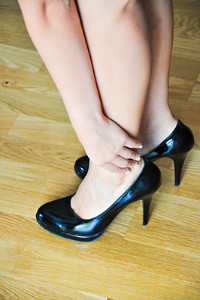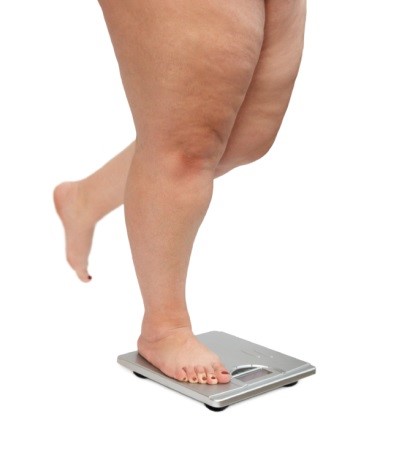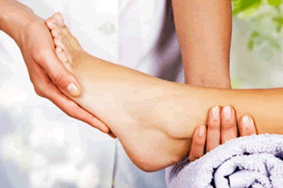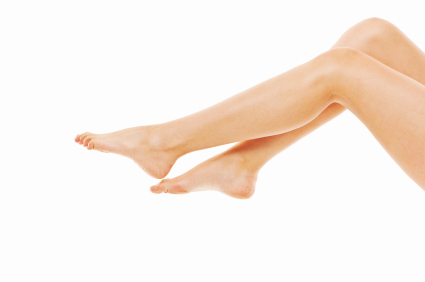 One of the most common causes of foot pain for women stems from the frequent wearing of high heels. Though they may be stylish, heels can contribute to all sorts of problems. Due to the angle that the foot is forced to maintain, circulation can be slowed or even cut off. This can lead to leg muscle issues, a stiffened Achilles tendon, and resulting spasms and pain. If you are suffering any kind of pain from wearing high heels, consult a doctor. In the meantime, try to limit the amount of time that you wear them. If you have to wear heels for work, take them off as soon as you get home. Stretching may also help some of the symptoms, but reducing the amount of walking around you do in high heels is the best way to prevent the pain.
One of the most common causes of foot pain for women stems from the frequent wearing of high heels. Though they may be stylish, heels can contribute to all sorts of problems. Due to the angle that the foot is forced to maintain, circulation can be slowed or even cut off. This can lead to leg muscle issues, a stiffened Achilles tendon, and resulting spasms and pain. If you are suffering any kind of pain from wearing high heels, consult a doctor. In the meantime, try to limit the amount of time that you wear them. If you have to wear heels for work, take them off as soon as you get home. Stretching may also help some of the symptoms, but reducing the amount of walking around you do in high heels is the best way to prevent the pain.
High heels have a history of causing foot problems. If you have any concerns about your feet or , contact Brent Harwood, DPM from Southeast Podiatry. Our doctor can provide the care you need to keep you pain-free and on your feet.
Effects of High Heels on the Feet
High heels are popular shoes among women because of their many styles and societal appeal. Despite this, high heels can still cause many health problems if worn too frequently.
Which Parts of My Body Will Be Affected by High Heels?
What Kinds of Foot Problems Can Develop from Wearing High Heels?
How Can I Still Wear High Heels and Maintain Foot Health?
If you want to wear high heeled shoes, make sure that you are not wearing them every day, as this will help prevent long term physical problems. Try wearing thicker heels as opposed to stilettos to distribute weight more evenly across the feet. Always make sure you are wearing the proper shoes for the right occasion, such as sneakers for exercising. If you walk to work, try carrying your heels with you and changing into them once you arrive at work. Adding inserts to your heels can help cushion your feet and absorb shock. Full foot inserts or metatarsal pads are available.
If you have any questions please feel free to contact one of our offices located in Fairhope, Brewton, and Atmore, AL . We offer the newest diagnostic and treatment technologies for all your foot care needs.
Read more about Effect of High Heels on the Feet The holidays would not be complete without the endless gathering of family and friends, enjoying vast amounts of delicious food, decadent sweets, and festive cocktails. However, self-indulging in these treats go hand-in-hand with a heightened risk of health problems. Not only does weight gain increase your risk for things like heart attack and stroke, but it affects your body on a musculoskeletal level. Individuals who may be overweight or obese must also take into account the extra pressure they are placing on their feet, in particular, their arch. The amount of force placed on our feet can cause much pain and damage to the , leg, and hip due to improper weight distribution. It is important to always keep yourself on a good exercise routine to lower your risk of weight-gain, especially around the holiday season.
The holidays would not be complete without the endless gathering of family and friends, enjoying vast amounts of delicious food, decadent sweets, and festive cocktails. However, self-indulging in these treats go hand-in-hand with a heightened risk of health problems. Not only does weight gain increase your risk for things like heart attack and stroke, but it affects your body on a musculoskeletal level. Individuals who may be overweight or obese must also take into account the extra pressure they are placing on their feet, in particular, their arch. The amount of force placed on our feet can cause much pain and damage to the , leg, and hip due to improper weight distribution. It is important to always keep yourself on a good exercise routine to lower your risk of weight-gain, especially around the holiday season.
Obesity has become very problematic at this point in time and can have extremely negative effects on the feet. If you’re an obese individual and are concerned about your feet, contact one of our podiatrists from Southeast Podiatry. Our doctors can provide the care you need to keep you pain-free and on your feet.
Obesity and your Feet
Since your feet are what support your entire weight when standing, any additional weight can result in pain and swelling. Being overweight is one of the main contributors to foot complications.
Problems & Complications
Extra Weight – Even putting on just a few extra pounds could create serious complications for your feet. As your weight increases, your balance and body will shift, creating new stresses on your feet. This uneven weight distribution can cause pain, even while doing the simplest tasks, such as walking.
Diabetes – People who are overweight are at serious risk of developing type-2 diabetes, which has a drastic impact on the health of your feet. As you get older, your diabetes might worsen, which could lead to loss of feeling in your feet, sores, and bruises. You could also become more prone to various infections.
Plantar fasciitis – Pressure and stress that is placed on muscles, joints, and tendons can trigger plantar fasciitis, which is an inflammation of tissue that forms along the bottom of the foot.
If you have any questions, please feel free to contact one of our offices located in Fairhope, Brewton, and Atmore, AL. We offer the newest diagnostic and treatment technologies for all your foot care needs.
 Morton’s neuroma is a foot condition that often affects middle-aged women, especially those who wear narrow shoes. While benign, the condition can be very painful; pain typically affects the front of the foot and extends to the toes. Pain flare-ups tend to occur in response to irritation, trauma, or excessive pressure. Morton’s neuroma pain can be made worse by continual walking, especially while wearing narrow shoes. Morton’s neuroma can be diagnosed through a number of methods including clinical examinations, MRIs, or ultrasound. If you suspect you have Morton’s neuroma, be sure to contact your podiatrist.
Morton’s neuroma is a foot condition that often affects middle-aged women, especially those who wear narrow shoes. While benign, the condition can be very painful; pain typically affects the front of the foot and extends to the toes. Pain flare-ups tend to occur in response to irritation, trauma, or excessive pressure. Morton’s neuroma pain can be made worse by continual walking, especially while wearing narrow shoes. Morton’s neuroma can be diagnosed through a number of methods including clinical examinations, MRIs, or ultrasound. If you suspect you have Morton’s neuroma, be sure to contact your podiatrist.
Morton’s Neuroma is a very uncomfortable condition to live with. If you think you have Morton’s neuroma, contact one of our podiatrists from Southeast Podiatry. Our doctors will treat your foot concerns.
Morton’s Neuroma
Morton's neuroma is a painful foot condition that commonly affects the areas between the second and third or third and fourth toe, although other areas of the foot are also susceptible. Morton’s neuroma is caused by an inflamed nerve in the foot that is being squeezed and aggravated by surrounding bones.
What Increases the Chances of having Morton’s Neuroma?
Morton’s neuroma is a very treatable condition. Orthotics and shoe inserts can often be used to alleviate the pain on the forefront of the feet. In more severe cases, corticosteroids can also be prescribed. In order to figure out the best treatment for your neuroma, it’s recommended to seek the care of a podiatrist who can diagnose your condition and provide different treatment options.
If you have any questions, please feel free to contact our office located in Fairhope, Brewton, and Atmore, AL. We offer the newest diagnostic and treatment technologies for all your foot care needs.
 As winter approaches, we all know how important it is to make sure to keep our skin from getting too dry. Just as we use balms and moisturizers for our face and hands, there are many ways to protect against dry and cracked feet and heels. Glycerin lotions are some of the best remedies for combatting dryness. Hydrogenated oils are also very effective moisturizers, and can be used not only on your feet, but your and legs too. In addition, fruits such as bananas and pineapples have plentiful amounts of helpful enzymes to ensure smooth and crack-free Feet.
As winter approaches, we all know how important it is to make sure to keep our skin from getting too dry. Just as we use balms and moisturizers for our face and hands, there are many ways to protect against dry and cracked feet and heels. Glycerin lotions are some of the best remedies for combatting dryness. Hydrogenated oils are also very effective moisturizers, and can be used not only on your feet, but your and legs too. In addition, fruits such as bananas and pineapples have plentiful amounts of helpful enzymes to ensure smooth and crack-free Feet.
Cracked heels are unsightly and can cause further damage to your shoes and feet. If you have any concerns, contact one of our podiatrists from Southeast Podiatry. Our doctors can provide the care you need to keep you pain-free and on your feet.
Cracked Heels
Cracked heels are unappealing, and make it harder for you walk around in sandals. Not only may they look bad, but they can also tear stockings, socks, and wear out your shoes. There are several methods to help restore a cracked heel and prevent further damage.
How do you get them?
Dry skin is the number one culprit in creating cracked heels. Many athletes, walkers, joggers, and even swimmers suffer from cracked heels. Age and skin oil production play a role to getting cracked heels as well.
Promote Healing
Over the counter medicines can help, especially for those that need instant relief, or who suffer from chronic dry feet.
Wear Socks – wearing socks with medicated creams, helps lock in moisture so it can stay on longer.
Moisturizers – applying it both day and night will help alleviate dryness which causes cracking.
Pumice Stones – these remove dead skin, and then you can massage cream onto your foot. This way the cream will be absorbed. The skin needs to be exfoliated; therefore the outer layer dead skin needs removal.
Change in Diet
Eating healthy, with a well-balanced diet, will give the skin a fresh and radiant look. Your body responds to what kinds of food you ingest. Omega-3 fatty acids and zinc supplements will also help with skin tissue.
Most importantly seek a health professional for foot care if something is wrong or doesn’t seem to be working. A podiatrist will help you with any questions or information needed.
If you have any questions, please feel free to contact one of our offices located in Fairhope, Brewton, and Atmore, AL. We offer the newest diagnostic and treatment technologies for all your foot care needs.